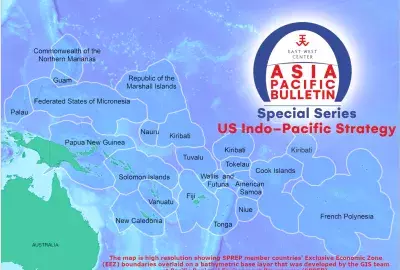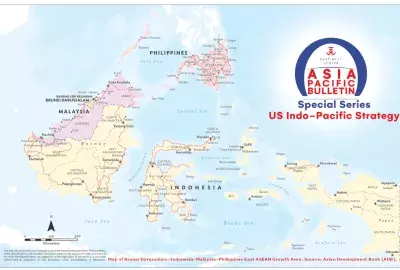Error message
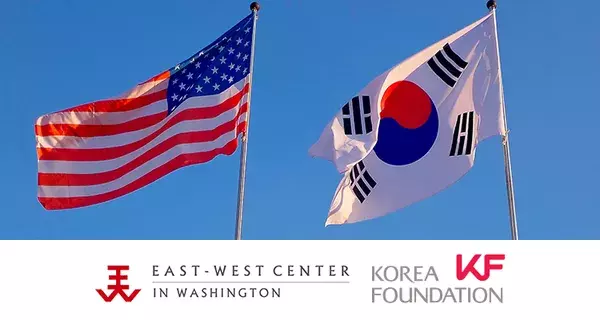
Mr. Seth Hays, Chief Representative, Asia-Pacific, at the International Trademark Association, explains that “both the US and ROK cooperate with ASEAN countries to improve IP protections, including on the issue of online counterfeits, most notably through their respective IP offices: the United States Patent and Trademark Office and the Korean Intellectual Property Office.”
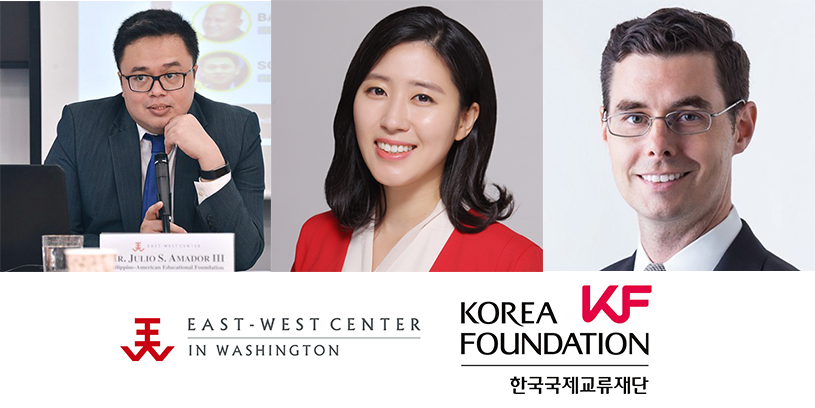
A recording of a companion webinar to this piece will be published on this East-West Center events page when available.
This piece and its companion webinar were produced as a part of the United States-Republic of Korea (ROK) Cooperation in Southeast Asia: Trade, Investment, and Multilateralism webinar series and online, collaborative policy research program, a joint effort between the East-West Center in Washington and the Korea Foundation, which generously sponsors the program
One of the fastest-growing areas driving connectivity and digital innovation in Southeast Asia is e-commerce. In parallel, the sale of counterfeit goods online has become one of the fastest-growing forms of intellectual property (IP) infringement. Therefore, the sustainable continuation of the region’s unprecedented e-commerce growth requires enhancing IP protection as a legal means to support innovation and rules-based digital trade.
As innovation-based economies with robust IP frameworks that have supported the growth of world-renowned brands, both the United States and South Korea (ROK), have an interest in backing strong IP protections across Southeast Asia. The Association of Southeast Asian Nations (ASEAN) is the fourth- and second-largest export market for the United States and South Korea respectively. All trade partners have much to gain in strategically addressing online counterfeiting to strengthen consumer confidence and trust in online commerce. The Biden-Moon Summit of May 2021 concluded with a joint statement that Washington and Seoul would “…work closely together to promote greater connectivity and foster digital innovation within ASEAN.” They should add IP protection to these shared objectives.
ASEAN’s E-Commerce Counterfeiting Problem
During the COVID-19 Pandemic, consumers in Southeast Asia pivoted to e-commerce to buy essentials, personal protective equipment (PPE) and everyday items while complying with social distancing and lockdown orders. As a result, online e-commerce rose by over 60% across the region in 2020 according to research conducted by the consultancy firm Bain.
Unfortunately, criminal networks also took advantage of the surge in e-commerce to defraud online consumers. Across the region, reports of online sales of counterfeit goods skyrocketed. In Singapore, for example, complaints from consumers increased 300% in 2020. In the Philippines, complaints about IP-related crime in the first nine months of 2020 exceeded the previous five years combined, 90% of which arose from online transactions, according to the IP Office of the Philippines.
The second hurdle to effective IP enforcement is what some might deem the region’s forte: diversity. As Table 1 demonstrates, IP and e-commerce vary greatly across ASEAN, from Singapore, a jurisdiction with a smaller e-Commerce market but robust IP frameworks, to Indonesia, an economy with a large e-Commerce market but a developing IP protection infrastructure.
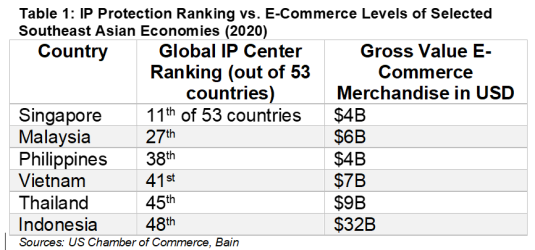
The diversity of the region complicates the protection of intellectual property rights. Countries with weaker protections have the greatest volume of sales. At the same time, a brand owner needs to register trademarks separately in each country, as well as monitor their rights across a multitude of e-commerce platforms and several languages in order to comprehensively protect their rights.
How US-ROK Cooperation Can Support Southeast Asia’s IP Opportunities
Both the US and ROK cooperate with ASEAN countries to improve IP protections, including on the issue of online counterfeits, most notably through their respective IP offices: the United States Patent and Trademark Office (USPTO) and the Korean Intellectual Property Office (KIPO).
The USPTO has an IP attaché based in Thailand, covering Southeast Asia. Cooperation activities occur with countries across the region. Coordination also occurs with other US government departments which cover IP-related matters, such as the State Department, Justice Department, and Department of Homeland Security.
KIPO has IP Helpdesks in Indonesia, Vietnam, and Malaysia. These helpdesks assist Korean IP owners with protecting their rights and provide capacity training for local IP offices. KIPO also has taken proactive measures in the past two years to address online counterfeiting in the region. For example, an initiative started in 2020 monitors e-commerce marketplaces in Southeast Asia for online counterfeits infringing Korean brands.
The United States and South Korea also work to improve IP in Southeast Asia through multilateral organizations. For example, both countries have working relationships with the ASEAN Working Group on IP Cooperation (AWGIPC), which has two deliverables related to online infringement–one to develop a data sharing platform on online infringement and the other to develop guidelines to help enforce rights online–in its 10-year action plan following a mid-term update in 2021.
The US and ROK with partners from Southeast Asia can do more to lead on this issue through improved resource coordination and prioritizing the issue of online counterfeits at the multilateral level.
Recommendations For US and ROK Engagement to Support ASEAN IP Protections
Strengthen existing cooperation projects, particularly at the multilateral level through ASEAN and APEC.
• Both countries should continue focusing on projects to address online counterfeits such as those undertaken by the USPTO and KIPO–and could benefit from better resource coordination and communication.
• The ROK should create an IP Attaché for Southeast Asia and raise the diplomatic presence of IP in the region.
• Both countries should promote projects at multilateral organizations such as WIPO and APEC’s Intellectual Property Experts Group to address online counterfeiting in the region.
Prioritize the issue of online counterfeiting in trade relationships.
• Digital Trade Agreements are proliferating, exemplified by Singapore’s recent agreements with Australia, New Zealand, and Chile. Should the United States and South Korea enter into digital trade agreements, they should specifically include language protecting against harm to consumers from counterfeit products sold online, which current agreements lack.
• Future trade agreements can include updated provisions previously negotiated in the Anticounterfeiting Trade Agreement (ACTA) that was signed by the United States, South Korea, and ASEAN member state Singapore, although ACTA was never ratified and did not come into force.
Establish an updated cooperation framework with government and industry partners through an IP Enforcement Center of Excellence.
• An IP Enforcement Center of Excellence can be a public-private partnership platform to share actionable information across borders to reduced trade in counterfeit goods in the region. Existing public-private cooperation models exist to address IP infringement, such as the ROK’s Customs’ Trade-related IPR Protection Association (TIPA), which addresses the shipment of counterfeits through the mail. Results-oriented government cooperation models exist as well, such as between the United States and European Union (EU) with the Trans-Atlantic IPR Working Group.
• The US-ROK and Southeast Asian countries should commission a research report on the problem of online counterfeits in Southeast Asia. This report could be similar to the recently released report by the OECD and the European IP Office, entitled, “Misuse of e-commerce for trade in counterfeits”.
• Any initiative should include other trade partners, including China. In 2020, ASEAN became China’s largest trade partner, and at the same time, China is the manufacturing base for many counterfeit goods, according to the OECD. Thus, any project to improve IP protections in the region must include cooperation with China, and other major trade partners, such as the UK, EU, Japan, and Australia.
As e-commerce markets expand in Southeast Asia, US and ROK brands will continue to invest in these online marketplaces. Ergo, a strategic focus on addressing online counterfeiting—especially, where it protects public health, safety, and confidence in e-commerce—will benefit the public in ASEAN and all trading partners.
Mr. Seth Hays, Chief Representative, Asia-Pacific, at the International Trademark Association, explains that “both the US and ROK cooperate with ASEAN countries to improve IP protections, including on the issue of online counterfeits, most notably through their respective IP offices: the United States Patent and Trademark Office and the Korean Intellectual Property Office.”

A recording of a companion webinar to this piece will be published on this East-West Center events page when available.
This piece and its companion webinar were produced as a part of the United States-Republic of Korea (ROK) Cooperation in Southeast Asia: Trade, Investment, and Multilateralism webinar series and online, collaborative policy research program, a joint effort between the East-West Center in Washington and the Korea Foundation, which generously sponsors the program
One of the fastest-growing areas driving connectivity and digital innovation in Southeast Asia is e-commerce. In parallel, the sale of counterfeit goods online has become one of the fastest-growing forms of intellectual property (IP) infringement. Therefore, the sustainable continuation of the region’s unprecedented e-commerce growth requires enhancing IP protection as a legal means to support innovation and rules-based digital trade.
As innovation-based economies with robust IP frameworks that have supported the growth of world-renowned brands, both the United States and South Korea (ROK), have an interest in backing strong IP protections across Southeast Asia. The Association of Southeast Asian Nations (ASEAN) is the fourth- and second-largest export market for the United States and South Korea respectively. All trade partners have much to gain in strategically addressing online counterfeiting to strengthen consumer confidence and trust in online commerce. The Biden-Moon Summit of May 2021 concluded with a joint statement that Washington and Seoul would “…work closely together to promote greater connectivity and foster digital innovation within ASEAN.” They should add IP protection to these shared objectives.
ASEAN’s E-Commerce Counterfeiting Problem
During the COVID-19 Pandemic, consumers in Southeast Asia pivoted to e-commerce to buy essentials, personal protective equipment (PPE) and everyday items while complying with social distancing and lockdown orders. As a result, online e-commerce rose by over 60% across the region in 2020 according to research conducted by the consultancy firm Bain.
Unfortunately, criminal networks also took advantage of the surge in e-commerce to defraud online consumers. Across the region, reports of online sales of counterfeit goods skyrocketed. In Singapore, for example, complaints from consumers increased 300% in 2020. In the Philippines, complaints about IP-related crime in the first nine months of 2020 exceeded the previous five years combined, 90% of which arose from online transactions, according to the IP Office of the Philippines.
The second hurdle to effective IP enforcement is what some might deem the region’s forte: diversity. As Table 1 demonstrates, IP and e-commerce vary greatly across ASEAN, from Singapore, a jurisdiction with a smaller e-Commerce market but robust IP frameworks, to Indonesia, an economy with a large e-Commerce market but a developing IP protection infrastructure.

The diversity of the region complicates the protection of intellectual property rights. Countries with weaker protections have the greatest volume of sales. At the same time, a brand owner needs to register trademarks separately in each country, as well as monitor their rights across a multitude of e-commerce platforms and several languages in order to comprehensively protect their rights.
How US-ROK Cooperation Can Support Southeast Asia’s IP Opportunities
Both the US and ROK cooperate with ASEAN countries to improve IP protections, including on the issue of online counterfeits, most notably through their respective IP offices: the United States Patent and Trademark Office (USPTO) and the Korean Intellectual Property Office (KIPO).
The USPTO has an IP attaché based in Thailand, covering Southeast Asia. Cooperation activities occur with countries across the region. Coordination also occurs with other US government departments which cover IP-related matters, such as the State Department, Justice Department, and Department of Homeland Security.
KIPO has IP Helpdesks in Indonesia, Vietnam, and Malaysia. These helpdesks assist Korean IP owners with protecting their rights and provide capacity training for local IP offices. KIPO also has taken proactive measures in the past two years to address online counterfeiting in the region. For example, an initiative started in 2020 monitors e-commerce marketplaces in Southeast Asia for online counterfeits infringing Korean brands.
The United States and South Korea also work to improve IP in Southeast Asia through multilateral organizations. For example, both countries have working relationships with the ASEAN Working Group on IP Cooperation (AWGIPC), which has two deliverables related to online infringement–one to develop a data sharing platform on online infringement and the other to develop guidelines to help enforce rights online–in its 10-year action plan following a mid-term update in 2021.
The US and ROK with partners from Southeast Asia can do more to lead on this issue through improved resource coordination and prioritizing the issue of online counterfeits at the multilateral level.
Recommendations For US and ROK Engagement to Support ASEAN IP Protections
Strengthen existing cooperation projects, particularly at the multilateral level through ASEAN and APEC.
• Both countries should continue focusing on projects to address online counterfeits such as those undertaken by the USPTO and KIPO–and could benefit from better resource coordination and communication.
• The ROK should create an IP Attaché for Southeast Asia and raise the diplomatic presence of IP in the region.
• Both countries should promote projects at multilateral organizations such as WIPO and APEC’s Intellectual Property Experts Group to address online counterfeiting in the region.
Prioritize the issue of online counterfeiting in trade relationships.
• Digital Trade Agreements are proliferating, exemplified by Singapore’s recent agreements with Australia, New Zealand, and Chile. Should the United States and South Korea enter into digital trade agreements, they should specifically include language protecting against harm to consumers from counterfeit products sold online, which current agreements lack.
• Future trade agreements can include updated provisions previously negotiated in the Anticounterfeiting Trade Agreement (ACTA) that was signed by the United States, South Korea, and ASEAN member state Singapore, although ACTA was never ratified and did not come into force.
Establish an updated cooperation framework with government and industry partners through an IP Enforcement Center of Excellence.
• An IP Enforcement Center of Excellence can be a public-private partnership platform to share actionable information across borders to reduced trade in counterfeit goods in the region. Existing public-private cooperation models exist to address IP infringement, such as the ROK’s Customs’ Trade-related IPR Protection Association (TIPA), which addresses the shipment of counterfeits through the mail. Results-oriented government cooperation models exist as well, such as between the United States and European Union (EU) with the Trans-Atlantic IPR Working Group.
• The US-ROK and Southeast Asian countries should commission a research report on the problem of online counterfeits in Southeast Asia. This report could be similar to the recently released report by the OECD and the European IP Office, entitled, “Misuse of e-commerce for trade in counterfeits”.
• Any initiative should include other trade partners, including China. In 2020, ASEAN became China’s largest trade partner, and at the same time, China is the manufacturing base for many counterfeit goods, according to the OECD. Thus, any project to improve IP protections in the region must include cooperation with China, and other major trade partners, such as the UK, EU, Japan, and Australia.
As e-commerce markets expand in Southeast Asia, US and ROK brands will continue to invest in these online marketplaces. Ergo, a strategic focus on addressing online counterfeiting—especially, where it protects public health, safety, and confidence in e-commerce—will benefit the public in ASEAN and all trading partners.





